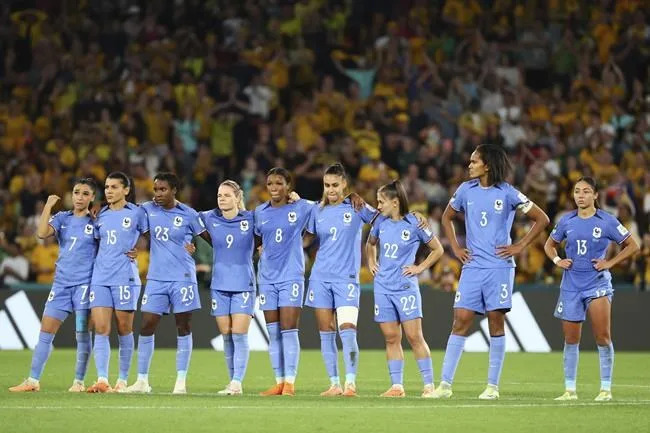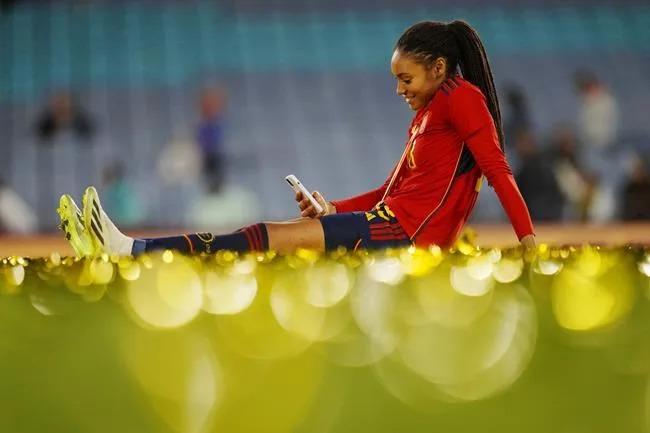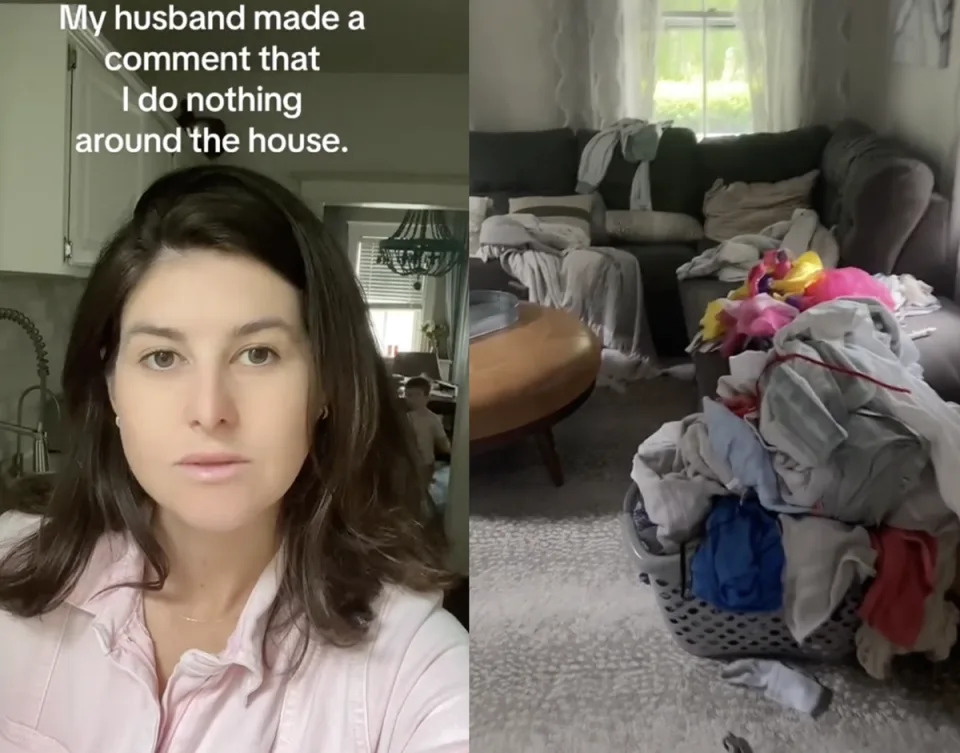Mon, August 21, 2023

SYDNEY (AP) — Teams headed home from the Women's World Cup with uncertain futures but hopes that the monthlong tournament would spur new interest and further investment in the game.
For some teams, like Nigeria, the Philippines and Jamaica, the struggle for funding, support and recognition will continue.
More established teams like Germany, Brazil, Canada and the United States now begin the post-tournament soul-searching about what went wrong.
Spain, which defeated England 1-0 in the final on Sunday, can revel as first-time champions.
“We need to be ready, because after this FIFA Women's World Cup women's football is going to explode in every single one of your countries,” FIFA chief women's football officer Sarai Bareman said at a women's soccer conference held in the days before the final. "We need to be ready for it. There will be millions and millions of women and girls around the world who will sign up to play football for the first time ever after this World Cup.
“Everyone needs to stand ready, with investment, with infrastructure, with coaches, with referees, with tournaments, member associations, federations, confederations. We need to stand ready to receive that interest and retain it in our game in a sustainable way.”
The next major tournament for women's soccer is next year's Olympics in France. The French were eliminated from the World Cup in a penalty shootout after a scoreless draw with co-host Australia in the quarterfinals.
Before France even got to the World Cup the team had some upheaval. Wendie Renard threatened not to play for the team, and the French federation responded by firing coach Corinne Diacre in March and hiring Herve Renard, who coached Saudi Arabia's men at the World Cup in Qatar.
Herve Renard, whose contract runs through the Paris Olympics, was already looking forward to next year.
“We have no regrets," he said. "Next year we’ll be back, we’ll be back at home and we are going to try and glean something from this.”
The United States is in the market for a new coach after the two-time defending World Cup champions crashed out of the tournament at the earliest point ever. Sweden defeated the United States in a penalty shootout in the round of 16.
U.S. coach Vlatko Andonovski resigned after the tournament. The team needs to work fast to name a replacement, because the Americans are among four teams who have already qualified for the Olympics — along with France, Brazil and Colombia.
The Brazilians didn’t emerge from the group stage for the first time since 1995. Afterward, Marta said a tearful goodbye after her sixth World Cup.
“Women’s football doesn’t end here. Women’s football in Brazil doesn’t end here,” Marta said. “We need to understand this.”
Nigeria has asked global players' union FIFPRO to intervene and make sure the team received the World Cup bonuses for every player participating in the tournament. Nigeria's players were each set to earn $60,000 for advancing to the knockout round. The Super Falcons fell to England on penalties in the round o1 6.
FIFPRO confirmed it was assisting the team in not only receiving the bonuses, but also other payments dating back to 2021.
FIFA dedicated individual payments from the prize pool for each player at the World Cup. All participants were to receive $30,000, with the total growing the further along teams got in the tournament. FIFPRO was going to lend help to make sure each player received the funds.
Spain's players each earned a $270,000 bonus for winning the tournament. The federation earned $4.29 million.
The Philippines was among eight teams playing in their first World Cup. The team upset New Zealand 1-0 in the group stage for a historic victory. But it wasn't enough to get the team out of the group stage.
Canada returns to a messy contract situation with its federation. The women's team has been without a contract for a year, and reached an interim funding agreement during the tournament that guaranteed the players would be paid.
The Canadians will be back at work soon, hosting Jamaica in an Olympic qualifier in late September.
The Reggae Girlz did not have many friendly matches in the run-up to the World Cup and there were crowdfunding campaigns to help the players pay for travel and accommodations. It was hoped that their success in the World Cup — they advanced to the knockout round for the first time — would translate into additional support from the Jamaican federation.
“The smaller countries will realize that there’s a platform out there and I think young women all over the world, they’re looking,” Jamaica coach Lorne Donaldson said. “I think all of these governments, everybody, it’s time to step up. Cut the bull crap and step up for women’s football and let’s move along.”
Morocco was another of the first-time teams in the World Cup and played well enough to advance to the knockout round, a first for an Arab and North African team at the World Cup.
Morocco has poured money into its women's program. The federation not only created an academy but it pays its players monthly wages to encourage young women to play.
“I look at these debutant teams, I look at these players, so investment is paying dividends,” former U.S. coach Jill Ellis said. “I am yelling from the highest mountain top that it’s not a matter of if you should, it’s why would you not invest in women’s football?”
___
AP Sports Writer John Pye contributed to this report.
___
AP Women's World Cup coverage: https://apnews.com/hub/fifa-womens-world-cup
Anne M. Peterson, The Associated Press
Sun, August 20, 2023

SYDNEY (AP) — Newly crowned Women's World Cup champion Spain has established itself for a long run among soccer's elite with its young and talented roster of rising stars.
La Roja defeated England 1-0 in Sunday's final for their first major tournament title. Over the course of the month-long event, Spain played through the turbulence of last year's player rebellion and the injury-diminished role of two-time Ballon d'Or winner Alexia Putellas.
Aitana Bonmati, at just 25 years old, solidified her credentials as a top midfielder, and 19-year-old forward Salma Paralluelo proved to be a rising global star.
“I know that this is the dream we've had since we were little. So right now it is difficult to comprehend. But when we get home, we’ll really know what we did," Paralluelo said. "It’s something huge.”
Spain joined Germany as the only two nations to win both men's and women's World Cup titles and Bonmati spoke about inspiring a generation — just like her hero Andres Iniesta influenced her in 2010 when the Spanish men won the World Cup in South Africa.
Bonmati and her teammates after the match were already wearing new jerseys that included the star above Spain's crest that signifies a World Cup title.
“Today we have this star and this medal and this cup, but it’s for all of them, all of those who have fought for more equality and to get us to a better place," said Bonmati. "We love that we could contribute our part to be role models for all those girls and boys. Very emotional to have achieved something so extraordinary.”
More than anything else, Spain's victory showed that the rest of the world is catching up to the traditional powers. Germany, Brazil and the United States all suffered surprisingly early exits from the tournament.
Few expected the traditional soccer powerhouses to have long gone home by the time Spain hoisted the trophy.
An expanded field of 32 teams was expected to expose the disparity in the women's game. But instead, teams including Morocco, South Africa and Jamaica all advanced to the knockout round to defy expectations. Morocco was one of eight teams playing in its first Women's World Cup.
The semifinals included four teams that had never won a World Cup title: Spain, England, Sweden and Australia. Sweden defeated Australia 2-0 in the third-place match.
Spain was certainly among the top teams heading into the tournament, but not the favorite. The favorite was the United States, the two-time defending champions. But the Americans were eliminated on a penalty shootout with Sweden in the Round of 16, the team's earliest departure from the tournament ever.
While Spain had been building to this point — nine players on the squad were from Champions League winner Barcelona, and the country had claimed the 2018 under-17 World Cup and the 2022 under-20 World Cup — turmoil surrounding the team in the past year had created doubts.
Last September, 15 players stepped down from the national team in order to protect their mental health. They called on the Spanish federation to create a more professional environment. Three of the “Las 15" — Bonmati, Ona Batlle and Mariona Caldentey — returned to the team for the tournament.
Then there was the uncertainty surrounding Putellas, the back-to-back Ballon d'Or winner, who tore her ACL last year and was clearly still working her way back during the course of the World Cup. She started on the bench for the title match, while Paralluelo got her first start.
“We fought hard, that’s the truth, until we felt like we had nothing left. But when we go to the airport and see a girl with a football or with a football jersey and the desire to play it fills us with energy again and makes us keep fighting for what we’re still missing,” Putellas said.
Spain's joy over the championship was tinged with sadness, too.
Following the match the Spanish federation reported that Olga Carmona's father had died following a long illness. She was told after the match.
Carmona scored the lone goal in the match against England. She also scored the game-winner in the 89th minute over Sweden in the semifinals. She is just the seventh player in tournament history to score in both the semifinals and finals.
Paralluelo, who won young player of the tournament honors, was among a group of players who stole the spotlight during the tournament. She joined Colombia's 18-year-old phenom Linda Caicedo, and 23-year-old Hinata Miyazawa, who scored five goals to win the tournament's Golden Boot.
Older stars played in their final World Cup, including Brazilian legend Marta, U.S. forward Megan Rapinoe, Sweden's Caroline Seger and Argentina's Estephani Banini.
“Everything that we’d hope for this to be on every level, it’s happened, in my opinion. We’ve seen rising stars. We’ve seen players saying farewell to the game. We’ve seen giants fall. We’ve seen newcomers,” former U.S. coach Jill Ellis said about the tournament. “I just think, all of these pieces here speak to the fact that if you do invest in this, you will reap incredible benefits.”
Bonmati won the Golden Ball award for the tournament's best player. Afterward, she said it was “not fair” to address Spain's tumultuous year. Putellas suggested that the players who stepped down were also a part of the team's World Cup journey.
Like her Barcelona teammate Paralluelo, Bonmati said the magnitude of what she called a “unique and historic” moment would take time to sink in.
“I am without words. I can't believe it,” she said. “I am going to need time to savor this victory. This trophy in incredible.”
Alexia Putellas
M|#11
Salma Paralluelo
F|#18
Olga Carmona
Mariona Caldentey
F|#8
Hinata Miyazawa
M|#7
Caroline Seger
M|#17
Megan Rapinoe
 |F|#15
|F|#15Ona Batlle
D|#2
___
AP World Cup coverage: https://apnews.com/hub/fifa-womens-world-cup
Anne M. Peterson, The Associated Press








